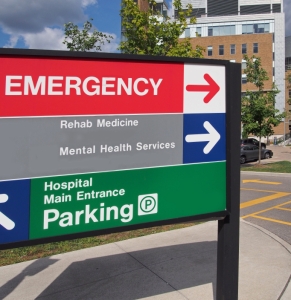I don’t usually post trigger warnings on specific posts since I think it’s a fair expectation that a blog about mental health might contain information that might trigger a sensitivity to that topic, but since this post deals specifically with suicide, self-harm and a crisis, consider yourself specifically warned.
I’ve wanted to write a longer-form piece on my first mental health crisis since I started blogging, but for a long time I’ve sort of blocked it out, stuck it away in a part of my mind that I choose not to revisit often. If you noticed a longer than usual gap between some of my posts this month it’s because I’ve been working on this piece on and off, sometimes trying to recall details and sometimes trying to find ways to write around them if it might intrude into others’ experiences. This all happened ten years ago and so I may not get every detail exactly right or in the correct order, and I try to note that where possible. There were a number of people who proved to be critically important for helping me and my dad over the period this happened, particularly the staff and my friends at Park Bethesda. I owe them all a deep debt of gratitude. I need to thank my family- especially my mom and dad for their support during this crisis, but also in the aftermath. It is not an exaggeration for me to suggest that I would not be here today without them.
In December 2005 I made my first suicide attempt. I was a senior in college and the idea that I might be mentally ill hadn’t ever really crossed my mind. I was reeling from a housing situation that made me feel isolated from friends, I was struggling academically and anxious about just what the hell I was going to do after college. Add to this mix my destructive habit of drinking, and I was a ticking time bomb for a mental health crisis. Without going into details of the how, I wrote a note (or a series of notes… I honestly can’t recall exactly what I did), got drunk and made my attempt. For some reason something clicked in my head and before passing out I called my father, who called the university to send someone up to my apartment.
 I was sort of in and out of consciousness when the ambulance came. I remember the paramedic asking what I had taken, and then asking me questions about myself in an effort to keep me awake. I recall the bustle in the emergency room and all of a sudden felt ashamed for being there, for taking up the time of doctors and nurses and paramedics when there were, from my perspective, so many real medical emergencies. I wanted to hide my face. What had I done? Someone told me that my father was driving down to Bethesda from Syracuse and would be with me in a few hours. In order to get the alcohol and drugs out of my system I had to drink a concoction known as liquid charcoal, which tastes exactly as unpleasant as it sounds (and it doesn’t look any better). Basically it’s a supercharged laxative that forces everything out of your system with the approximate concentrated power of a fire hose several times in a short period.
I was sort of in and out of consciousness when the ambulance came. I remember the paramedic asking what I had taken, and then asking me questions about myself in an effort to keep me awake. I recall the bustle in the emergency room and all of a sudden felt ashamed for being there, for taking up the time of doctors and nurses and paramedics when there were, from my perspective, so many real medical emergencies. I wanted to hide my face. What had I done? Someone told me that my father was driving down to Bethesda from Syracuse and would be with me in a few hours. In order to get the alcohol and drugs out of my system I had to drink a concoction known as liquid charcoal, which tastes exactly as unpleasant as it sounds (and it doesn’t look any better). Basically it’s a supercharged laxative that forces everything out of your system with the approximate concentrated power of a fire hose several times in a short period.
I remained in the emergency for room for several hours as they made sure the drugs and alcohol were removed from my system and no longer an immediate threat to my life. To be quite honest, I have a hard time recalling many details other than the liquid charcoal from that time. But several hours did indeed pass, because I was still in the emergency room when my father arrived.
The reunion was teary of course, but I was quickly engulfed by a sense of shame for my actions. How embarrassing for him to see his son like this, weak, broken and having no ability to cope with the world. Of course, these were all in my head. Depression tricks you and lies to you and makes you question even the most basic and fundamental of things, like the love a father has for a son. He told me how proud he was that I had called him, that I had reached out. Despite this, my mind was still convinced that on some level he was resentful and angry, and in some ways I was feeling even worse than I had earlier in the day.
When the doctor came to see us we were presented with two options: That I could voluntarily commit myself to the hospital’s psychiatric ward for further observation and recovery or that they would have me involuntarily committed. If that seems like a distinction without a difference, voluntary commitment meant avoiding a possible court hearing and engaging with a legal process regarding your commitment status. Voluntary commitment also promised the one thing I wanted more than anything, to just go home, if not immediately, then as soon as possible. And so it was late that night, physically and emotionally exhausted, I was brought to the psychiatric ward. I said goodbye to my father. He would be allowed to return the following day during visiting hours. I was wearing the clothes I had been in all day and the nurse, or attendant, or whoever (I’m still fuzzy on all of the details) asked for my belt and shoelaces. It took me a moment to understand. I complied, and passed them over. I was offered a hospital gown if I wanted it. I preferred my own clothes.
I was assigned a room with two beds, one of which was already occupied. My new roommate was asleep- I couldn’t make out much in the dark. Negative stereotypes of mental illness flooded my mind. I wasn’t sick, I wasn’t a danger to anyone but myself, why did I agree to this, what if this person is a murderer, what if he tries to assault me in my sleep, what if he’s standing over me with a homemade shiv in the morning…. I’m not proud that I thought these things, but that’s what was racing through my head as I tried to sleep that first night.
After a fitful night where, despite my exhaustion, sleep did not come easily, I found myself in the room. Orienting myself I saw the door to the hallway was open, and there was activity outside. Soft voices, friendly. I sat up, propping myself on my elbows. The roommate wasn’t there. I was still in my clothes from the day before. I climbed out of bed and poked my head out. A nurse or orderly or attendant told me that breakfast was down the hall in the lounge, and that they were glad I was up.
The lounge felt like a combination of a cafeteria and someone’s basement rec room. A few round tables were set up at the far end of the room where there was also a counter and window into a kitchen. Nearer to where I came in there was a couch and a few overstuffed chairs around a TV, which was off, and a few shelves of books. A coffee table had some magazines on it. I don’t remember exactly how many people were in the room, but there are three that stand out in my head.
One was my roommate, a tall, scrawny and wiry kid a few years younger than I was at the time probably in his late teens. He had a nervous energy, but was smiling and friendly, with shaggy brown hair. There was almost a puppy quality about him. Then there was a woman, maybe in her early thirties, with dark blonde hair. At one time I’m convinced she was very pretty, but now her teeth were yellowed, her hair looked unwashed and she had a raspy voice that made her sound much older than she was. Later I learned that both of them were heroin addicts, in the ward as part of a plea bargain or something- this was second-hand information and I never pressed them for details. They were both friendly, but my own nervous energy perked up when I was around them, and I always felt guarded.
The third was a man in maybe his early fifties. He was of average build, balding with very close cropped hair and reminded me a little of Michael Stipe from REM. His tone was always very even, very matter-of-fact and detached. The first thing he told me was that this was his third or fourth time in the ward and he’d probably be going home later in the day. I gathered that he was there, probably like me, for either a suicide attempt or self-harm.
Breakfast, and indeed all the meals there, was standard fare hospital food, so you didn’t eat it so much as pick at it. Or maybe that was just the liquid charcoal that still had my stomach acting funny. Either way, after I ate I went to a therapy session, one on one with the psychiatrist on duty.
He was older, maybe in his late fifties or sixties. His hair was like steel wool and I had trouble placing his accent- maybe Eastern European. He asked me a series of questions, hardly looking up from my chart. “Your father drive down from New York? Must have been a lot of traffic. Horrible.”
Yes, thank you for making me feel bad. He was blunt and gruff. He pronounced that I was depressed and he would get me started on Lexapro right away. I asked when I might be able to check out. Tomorrow afternoon, maybe day after.
I wanted to tell him “No, no, I don’t belong here. What I did was a mistake. I shouldn’t be here. My dad is here, just let him take me home.” Instead I asked about visiting hours.
My dad came in at some point to see me. He had spent the night at my apartment, picking it up, doing some laundry. He’d been talking with some of my friends, both letting them know I was OK and I’m sure trying to figure out what had happened. While he was there we called my mom and gave her an update. We also came up with a treatment plan for when I was released- one of the things the psychiatrist had asked about and, I’m sure my dad found out asking around at the hospital. A friend of his back home was a trained therapist, and my dad had called to ask him to fax or send a letter of some kind talking about both his qualifications and the priority he would give to meeting me once I got back to Syracuse. He had talked to people in both the Housing and Provost’s offices at American, finding out what their protocols were in this type of situation. It was the kind of work that was critical to my release (my priority) but also was important for him as far as having things to do during the day, given the limited visitation hours at the hospital.
 Again, I don’t remember whether it was before or after his visit, but sometime after lunch (again, which I only picked at), I went to a group session on alcohol and drug addiction. I was required to attend because I had been intoxicated at the time of my suicide attempt. My roommate and the young woman were also in the session with me. Their stories (which I won’t detail) were both sad and in many ways familiar, in that they talked about stress, anxiety and a search for a way out. I talked about my own issues, but felt like the spoiled preppy kid I probably was. I was self-conscious, but the group and the therapist leading it could not have been more supportive. I talked about some of my drinking habits, about the various stresses with class. I remembered I tried to make an excuse when my roommate said something along the lines of “Don’t worry man, we’re all fucked up here. It’s OK.” It was reassuring. It dawned on me that I was surrounded by people who knew what I was going through because it matched their own lived experiences. I opened up and talked about my drinking. About always wanting one more when it was clear the party was winding down. How I’d sneak a little “bonus” in when I was in the kitchen and everyone else was in the living room. I talked about how I yelled when I was drunk, how I could be mean and say cruel things. How sometimes I’d just be so sad that I would drink and cry by myself. What it all boiled down to was a loss of control.
Again, I don’t remember whether it was before or after his visit, but sometime after lunch (again, which I only picked at), I went to a group session on alcohol and drug addiction. I was required to attend because I had been intoxicated at the time of my suicide attempt. My roommate and the young woman were also in the session with me. Their stories (which I won’t detail) were both sad and in many ways familiar, in that they talked about stress, anxiety and a search for a way out. I talked about my own issues, but felt like the spoiled preppy kid I probably was. I was self-conscious, but the group and the therapist leading it could not have been more supportive. I talked about some of my drinking habits, about the various stresses with class. I remembered I tried to make an excuse when my roommate said something along the lines of “Don’t worry man, we’re all fucked up here. It’s OK.” It was reassuring. It dawned on me that I was surrounded by people who knew what I was going through because it matched their own lived experiences. I opened up and talked about my drinking. About always wanting one more when it was clear the party was winding down. How I’d sneak a little “bonus” in when I was in the kitchen and everyone else was in the living room. I talked about how I yelled when I was drunk, how I could be mean and say cruel things. How sometimes I’d just be so sad that I would drink and cry by myself. What it all boiled down to was a loss of control.
This isn’t to say that alcohol caused these problems. As I’ve learned in the years since I’ve learned that I still can become angry or sad, I still can be impulsive or deceitful, and I’m not proud of that. But anger and sadness are normal emotions, and most of us can express them in a healthy way, find ways to work them out. I think the deceitfulness became my defense against having to explain my impulsiveness and the resulting loss of control around my emotions. I was so scared of letting people know how out of control things were. These are all conclusions I can draw with the benefit of almost ten years of hindsight, of other battles and more therapy and over a year without alcohol. These didn’t come to me in that single group therapy session, but that’s where those seeds were planted.
After dinner I had to attend another one on one session with another therapist. This time instead of the older European sounding doctor who struck me as gruff and dismissive I met with a doctor who was probably in her early fifties, with big brown eyes and a gentle, lyrical voice. She stared deeply at me when she talked and, I’m not sure if she even took notes (though she must have). She was hypnotic as she asked about me. About my family. About school. About my friends. She asked whether I was a believer. I told her I was raised Presbyterian and went to church on Christmas and Easter, maybe a few other times each year.
She told me that the reason she asked was because she was a believer, that she had grown up in Pakistan and that her faith was critical to her as she came to America as an immigrant. She talked about the prayers in Islam, how the regularity and ritual of prayer gave her an anchor in her life when she was feeling sad, or angry or lonely. She said she wondered if I was a believer because she finds that for many people, no matter whether they are Muslim or Presbyterian, the rituals and comforts of belief can be an anchor for us when we feel as though we were adrift. Then she told me that the other things she had asked me about, my family, my friends and my routine at school could also be anchors. We talked about the steadying influence of family and friends. I told her that I wanted to go home with my father. She smiled. “I’ll see what I can do.”
The following morning I met with the first doctor again. He was looking at what must have been her notes from the previous evening’s session. He looked up and over his glasses at me. “You can leave today. At noon. I will have the hospital pharmacy prepare medication for the next thirty days. We will talk about a treatment plan going forward.”
My dad showed up with a clean change of clothes for me as we got ready to leave. We met with the older doctor again. He explained that I should go to our family doctor soon after going home. That I should make an appointment with my father’s friend who was a therapist. He shook and hands with us.
I wanted to say goodbye to the people I had met – my roommate, the young woman and the older man. I was told they were in group therapy. As we left the hospital I breathed in the cold frigid December air and looked back at the building. There were Christmas decorations in the hospital windows. Christmas was about a week and half away, then, a week later, New Year’s. A chance to start over?
 I made it through that first crisis, but it wouldn’t be my last. I’ve written about those here on the blog. Eventually after a few months I started drinking again. It wasn’t long after that before I stopped my medications and stopped seeing the therapist I’d been referred to by the University (one of the conditions of coming back for the second semester). I’ve had my share of troubles since that first time. But, there were some important seeds planted in those 72 hours. Today some of those lessons are bearing fruit in my recovery.
I made it through that first crisis, but it wouldn’t be my last. I’ve written about those here on the blog. Eventually after a few months I started drinking again. It wasn’t long after that before I stopped my medications and stopped seeing the therapist I’d been referred to by the University (one of the conditions of coming back for the second semester). I’ve had my share of troubles since that first time. But, there were some important seeds planted in those 72 hours. Today some of those lessons are bearing fruit in my recovery.

I really enjoyed reading this account of your experience. I went through something similar several years ago in a psychiatric hospital and then a few months ago in the ER from a suicide attempt. It’s such a scary, enlightening, and weird experience. Some things about my stay in the psychiatric hospital made me angry and still do, but some things were really helpful and necessary. I relate to when you say that “Depression tricks you and lies to you and makes you question even the most basic and fundamental of things, like the love a father has for a son.” And “I was so scared of letting people know how out of control things were.” Thank you for sharing this.
LikeLiked by 1 person